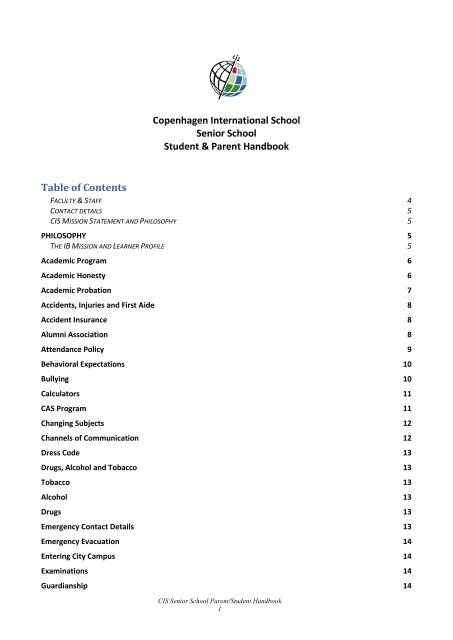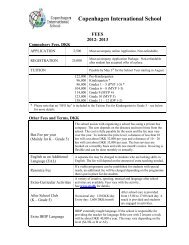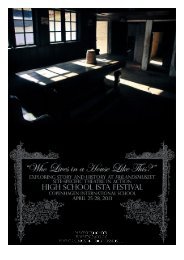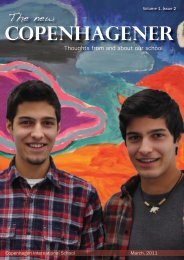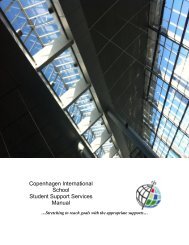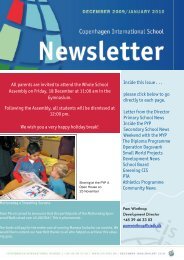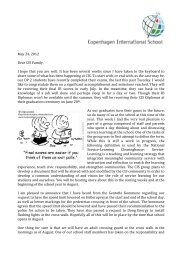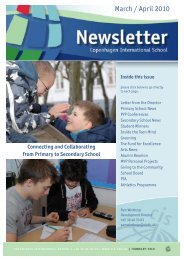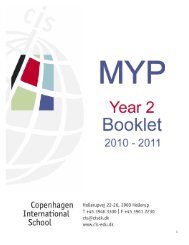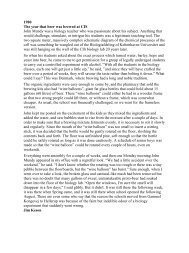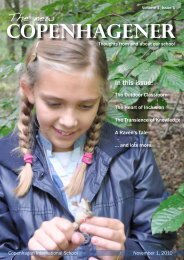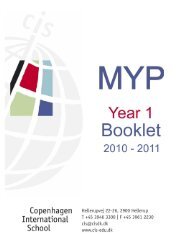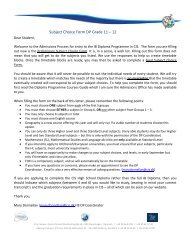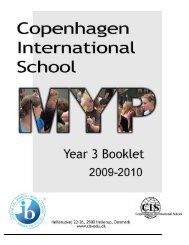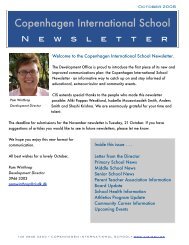here - Copenhagen International School
here - Copenhagen International School
here - Copenhagen International School
Create successful ePaper yourself
Turn your PDF publications into a flip-book with our unique Google optimized e-Paper software.
<strong>Copenhagen</strong> <strong>International</strong> <strong>School</strong><br />
Senior <strong>School</strong><br />
Student & Parent Handbook<br />
Table of Contents<br />
FACULTY & STAFF 4<br />
CONTACT DETAILS 5<br />
CIS MISSION STATEMENT AND PHILOSOPHY 5<br />
PHILOSOPHY 5<br />
THE IB MISSION AND LEARNER PROFILE 5<br />
Academic Program 6<br />
Academic Honesty 6<br />
Academic Probation 7<br />
Accidents, Injuries and First Aide 8<br />
Accident Insurance 8<br />
Alumni Association 8<br />
Attendance Policy 9<br />
Behavioral Expectations 10<br />
Bullying 10<br />
Calculators 11<br />
CAS Program 11<br />
Changing Subjects 12<br />
Channels of Communication 12<br />
Dress Code 13<br />
Drugs, Alcohol and Tobacco 13<br />
Tobacco 13<br />
Alcohol 13<br />
Drugs 13<br />
Emergency Contact Details 13<br />
Emergency Evacuation 14<br />
Entering City Campus 14<br />
Examinations 14<br />
Guardianship 14<br />
CIS Senior <strong>School</strong> Parent/Student Handbook<br />
1
Grading 15<br />
Graduation Requirements 16<br />
Homework 17<br />
Homework Cafe 17<br />
Laptops 17<br />
Library 17<br />
Lockers 18<br />
Lunches 18<br />
Missed Deadlines and Failure to Submit Work 18<br />
Open Campus 18<br />
Parent Coffee Mornings 18<br />
Parent Teacher Association (PTA) 19<br />
Physical Education (P.E) 19<br />
Publications 19<br />
SAT Testing 19<br />
Sports Activities 19<br />
Student awards 20<br />
Student Support Services 23<br />
Student Well-Being 25<br />
Timetable 25<br />
Trips 26<br />
Social Overnight/DP Retreat 26<br />
Activity Week 26<br />
Textbooks 26<br />
Transcripts, IB Results and Diplomas 27<br />
CIS Senior <strong>School</strong> Parent/Student Handbook<br />
2
Principal’s Welcome Message<br />
Dear Students and Parents,<br />
Welcome to the CIS Senior <strong>School</strong>. The Senior <strong>School</strong> comprises grades 9-12. It was created<br />
as a separate division of the school, and relocated to the City Campus, in 2011. This allowed<br />
not only for the growth of the school, but also for particular focus on the social, emotional<br />
and academic development of Senior <strong>School</strong> students.<br />
In 2013-14 the Senior <strong>School</strong> will have around 240 students, representing over 50<br />
nationalities. Cultural diversity is important to us, and we very much appreciate the variety<br />
of backgrounds and experiences that our students and their families bring to CIS. We also<br />
value our wonderful local community, and appreciate opportunities to incorporate Danish<br />
culture into our curriculum and school life. <strong>Copenhagen</strong> is a culturally and intellectually rich<br />
city, of which we are fortunate to be a part.<br />
CIS offers a rigorous Senior <strong>School</strong> academic program, driven by a strong commitment to our<br />
mission to develop the potential of each student in a stimulating environment of cultural<br />
diversity, academic excellence and mutual respect. We offer the IB curriculum throughout<br />
Senior <strong>School</strong>, comprising the 4 th and 5 th years of the Middle Years Program in grades 9 & 10,<br />
and the Diploma Program in grades 11 & 12. Our graduates receive a CIS High <strong>School</strong><br />
Diploma, accredited by the U.S North Eastern Association of <strong>School</strong>s and Colleges, and the<br />
Council of <strong>International</strong> <strong>School</strong>s. The majority of our students also complete the full IB<br />
Diploma.<br />
CIS also offers a range of co-curricular and extra-curricular activities, and t<strong>here</strong> are many<br />
ways to be involved in the life of the school beyond the classroom. We encourage our<br />
students to become involved in, develop and lead improvement initiatives, service learning<br />
opportunities and community events. Faculty and staff are always available for support and<br />
encouragement.<br />
This handbook is designed to be a reference so that you have necessary information readily<br />
available. It is important that you are familiar with school policies and procedures. The<br />
school website, http://www.cis.dk, also has up to date information, provides contact details<br />
for faculty and staff, and should be checked regularly for details of school events.<br />
I look forward to working with you throughout the school year<br />
Best wishes,<br />
Caroline Brokvam<br />
Senior <strong>School</strong> Principal<br />
CIS Senior <strong>School</strong> Parent/Student Handbook<br />
3
FACULTY & STAFF<br />
Name<br />
Mercedes Alborelli<br />
James Atkin<br />
Lydia Bernal Rodriguez<br />
Gideon Boulton<br />
Caroline Brokvam<br />
Ståle Brokvam<br />
Tristan Bunnell<br />
Bob Carignan<br />
Fred Chiappini<br />
Anne Collignan<br />
Joelle Dines<br />
Daniel Cooper<br />
Kristina Dodier<br />
Mary Donnellan<br />
Caroline Dourley<br />
Karsten Engelberg<br />
Aletta Faber<br />
Amy Faircloth<br />
Gora Lizaso<br />
Heidi Helmich<br />
Ina Hemme<br />
Lorenz Hindrichsen<br />
Karen Hornsøj-Møller<br />
Darren Howard<br />
Maria Iraci<br />
Mette Jessen<br />
Kristjan Jespersen<br />
Thomas Kunze<br />
Glen Johnson<br />
Shashi Krishna<br />
Katherine Krom<br />
Justin Kurrass<br />
Colin LaForet<br />
Rebecca Lindroos<br />
Garry McIntyre<br />
Paul Mitchell<br />
Richard Martens<br />
Vincent Murphy<br />
Anders Nielsen<br />
Lena Noring<br />
Olella Nyiendo<br />
Sze Yee Ong<br />
Ute Reichert<br />
Werner Reidel<br />
Daniel Sarstedt<br />
Oliver Todd<br />
Joyce Tromba<br />
Benjamin Ward<br />
Karen Watts<br />
Theo Wilhelm<br />
Lorraine Wykes<br />
Charlotte Zeeburg<br />
Position/Subject<br />
French<br />
Labratory Assistant<br />
Spanish<br />
Physics/Science<br />
Principal<br />
IT Director<br />
Economics<br />
Art<br />
Maths/Gr.11 Team Leader<br />
Learning Support<br />
French/HOD Theory of Knowledge (TOK)<br />
Humanities<br />
Counselor<br />
Diploma Program Coordinator/TOK<br />
Learning Support Coordinator<br />
Assistant Principal/CAS Coordinator/English<br />
HOD Mathematics<br />
Social & Cultural Anthropology/Humanities<br />
Art<br />
German<br />
Danish A/Danish B<br />
HOD Language A/English<br />
Danish B/French<br />
Music<br />
English as an Additional Language/Gr. 9 Team Leader<br />
Danish A<br />
Economics<br />
German<br />
Curriculum Coordinator/MYP Coordinator<br />
Computer Technology<br />
HOD Humanities/Geography<br />
Counselor<br />
Learning Support Assistant<br />
English<br />
Science/Chemistry<br />
Physical Education<br />
Mathematics<br />
Chemistry<br />
Physical Education<br />
Drama/Danish B<br />
History/TOK<br />
Mathematics<br />
HOD Language B/German<br />
Biology<br />
HOD Arts/Drama<br />
English/Gr. 10 Team Leader<br />
HOD Science/Design Technology<br />
Mathematics/Student Leadership Coordinator<br />
Director Student Support Services<br />
English/Humanities<br />
Biology/Design Technology/Gr. 11 Team Leader<br />
Nurse<br />
CIS Senior <strong>School</strong> Parent/Student Handbook<br />
4
STAFF<br />
Jonathan Lerwill<br />
Flemming Nielsen<br />
Lesley McDonald<br />
Leena Raassina<br />
Usman Hanif<br />
Position<br />
Janitorial Support<br />
Operations Manager<br />
Administrative Coordinator<br />
Reception/Catering Manager<br />
IT Support<br />
CONTACT DETAILS<br />
Address: City Campus, Stockholmsgade 59, 2100 København Ø.<br />
Phone: 39 46 33 08<br />
Office email: LesleyMcDonald@cis.dk<br />
CIS MISSION STATEMENT AND PHILOSOPHY<br />
Mission Statement<br />
Our mission is to develop the potential of each student in a stimulating environment of cultural diversity,<br />
academic excellence and mutual respect.<br />
PHILOSOPHY<br />
At <strong>Copenhagen</strong> <strong>International</strong> <strong>School</strong> we endeavor:<br />
• to educate our students in a stimulating environment to the highest possible academic<br />
standards using the <strong>International</strong> Baccalaureate Programs (PYP, MYP, DP).<br />
• to educate world citizens who, celebrating both their shared humanity and cultural<br />
diversity, will shape a more peaceful world.<br />
• to instill respect, tolerance, integrity and compassion; to promote the confidence and<br />
independence to be risk-takers; to create students who are open-minded, questioning<br />
and understanding.<br />
• to be aware of the social and emotional needs of each individual student and work<br />
with the home in a caring atmosp<strong>here</strong>, to provide a sense of stability.<br />
• to inspire creativity in each student in its broadest aspect and help to enlarge the<br />
human spirit both aesthetically and morally.<br />
• to create students who are respectful of, and knowledgeable about, their local and<br />
global environment.<br />
THE IB MISSION AND LEARNER PROFILE<br />
As an IB World <strong>School</strong>, CIS also supports the IB mission, “to develop inquiring, knowledgeable and caring<br />
young people who help to create a better and more peaceful world through intercultural understanding and<br />
respect… to become active, compassionate and lifelong learners who understand that other people, with<br />
their differences, can also be right.” We also work towards the IB Learner Profile. IB learners strive to be:<br />
• inquirers<br />
• knowledgeable<br />
• thinkers<br />
• communicators<br />
• principled<br />
• open-minded<br />
• caring<br />
• risk-takers<br />
• balanced<br />
• reflective.<br />
CIS Senior <strong>School</strong> Parent/Student Handbook<br />
5
ACADEMIC PROGRAM<br />
The school’s curriculum is international in nature. Upon successful completion of the course of studies,<br />
students will be prepared for higher education in their home countries or elsew<strong>here</strong>. The language of<br />
instruction is English and, w<strong>here</strong> appropriate, the school provides support to students through EAL<br />
instruction. When students have identified learning needs, the school offers Learning Support.<br />
The <strong>School</strong> Board has adopted the following educational programs:<br />
1. The Primary Years Program (PYP) for Kindergarten to grade 5.<br />
2. The Middle Years Program (MYP) for grades 6 through 10.<br />
3. The Diploma Program (DP) for grades 11 and 12.<br />
While CIS only offers Diploma Program classes in the final two years of high school, it is not necessary for a<br />
student to take the full IB Diploma. Alternatively, a student might work towards a CIS High <strong>School</strong> Diploma<br />
by taking a number of Diploma Program Courses, and might follow some, all, or none of the Core<br />
Requirements (the Extended Essay, TOK and CAS). In this case, the student will receive an IB Certificate for<br />
any subjects taken at examination level, and the CIS High <strong>School</strong> Diploma providing graduation requirements<br />
are met. It may also be possible for students in grades 11 and 12 to have online or tutored courses credited,<br />
or to enroll in language, arts, P.E or technology courses not at the Diploma level. CIS aims to be flexible and<br />
to provide a suitable academic program to meet the needs of all of our students. Student progress is<br />
monitored closely to ensure that courses selected are suiting students’ differing learning needs, tertiary<br />
study and career plans.<br />
ACADEMIC HONESTY<br />
All Senior <strong>School</strong> students are required to read these guidelines in order to be fully aware of, understand,<br />
and agree to ad<strong>here</strong> to the standards and policies of CIS and the IB with respect to Academic Honesty.<br />
Academic honesty requires that all students and teachers respect the integrity of one another's work and<br />
recognize the importance of acknowledging and safeguarding intellectual property.<br />
Academic dishonesty is a serious violation of the trust upon which our academic community depends. We<br />
are committed to the basic academic right that students receive due credit for work submitted for<br />
assessment. It is clearly a breach of integrity for students to submit work that represents the work of others<br />
as their own. The types of and consequences for such breaches of integrity are outlined below.<br />
Academic Malpractice<br />
Malpractice is behavior that results in, or may result in, a student (or students) gaining an unfair advantage<br />
in an assessment. Malpractice includes:<br />
1. Plagiarism: This is when a student represents the ideas or work of another person as their own. This can<br />
be intentional or unintentional, the consequence is the same.<br />
2. Collusion: This is when a student supplies their work to be copied or submitted for assessment by<br />
another student. The consequence for both students is the same.<br />
3. Duplication: This is when a student presents the same work for different assessments, (double dipping).<br />
4. Any other behavior that gains an unfair advantage. This includes cheating on an exam or test, taking<br />
unauthorized material into an exam or test, misconduct during an exam or test, falsifying a CAS record,<br />
etc.<br />
CIS Senior <strong>School</strong> Parent/Student Handbook<br />
6
Consequences of Malpractice at CIS<br />
If a student is found guilty of malpractice, the following will occur:<br />
• 1st Offense: The student is required to re-do the work and reminded of CIS’s academic policy. Parents<br />
are notified by the teacher and the malpractice is noted in school records.<br />
• 2nd Offense: The student is given zero for the work, parents are notified by the Principal, and the<br />
student receives disciplinary consequences. This second malpractice offense is noted in school records.<br />
• 3rd Offense: If a student is found guilty of a 3rd breach of academic honesty, they will receive no credit<br />
for the relevant course, and may be recommended for withdrawal.<br />
Any student who is found guilty of repeated malpractice, (or a serious first offense) is ineligible during the<br />
school year for any award or citation that requires good moral character as a criterion for selection.<br />
Note: CIS has the responsibility and reserves the right to contact prospective colleges and/or universities<br />
when a student has committed a serious breach of our Academic Honesty policy, to notify them of the<br />
nature of the malpractice.<br />
Consequences of Malpractice at IB<br />
If the IB finds a student guilty of malpractice, the following will occur:<br />
• If the amount of plagiarism is considered to be minimal, zero marks will be awarded for the<br />
assessment component, but a grade will still be awarded for the subject. This is referred to as<br />
‘Academic Infringement’<br />
• If a candidate is found to have plagiarized all or part of any assignment then no grade will be<br />
awarded for the subject. This automatically means that no Diploma can be awarded.<br />
• Misconduct during an examination will result in no grade being awarded for the specific subject<br />
involved. This automatically means no Diploma can be awarded.<br />
• If a candidate falsifies a CAS record, no Diploma will be issued until 12 months after the examination<br />
session have passed. The CAS record will need to be correctly completed.<br />
• If the case of malpractice is very serious, the candidate may not be allowed to re-register for<br />
examinations in any future session<br />
• An IB Diploma may be withdrawn from a candidate at any time if malpractice is subsequently<br />
established<br />
A full outline of the IB Academic Honesty Policy is available on the <strong>School</strong> and IB websites, and from the DP<br />
Coordinator.<br />
ACADEMIC PROBATION<br />
In order to ensure that students are able to cope with the demands of the Diploma Program, certain<br />
expectations are in place concerning the transfer between the Middle Years and Diploma Programs.<br />
Students must receive a minimum of 40 points in the MYP if they are to proceed directly to the Diploma. If a<br />
student receives between 36 and 40 points, they enter the Diploma on Probation.<br />
Probation means that they will begin Grade 11 following the full Diploma Program, but their progress will be<br />
monitored carefully. They will be expected to take advantage of all pastoral, academic and linguistic support<br />
offered. Should it be felt that the full Diploma course load is proving to be too challenging an experience,<br />
students will be required to switch pathways, and to focus on achieving the CIS High <strong>School</strong> Diploma rather<br />
than the IB Diploma. If a student is failing to achieve 24 points by the end of Semester 1 in DP, such a switch<br />
will be strongly recommended. Students who score lower than 36 points in the MYP are not recommended<br />
to enter the Diploma Program.<br />
CIS Senior <strong>School</strong> Parent/Student Handbook<br />
7
ACCIDENTS, INJURIES AND FIRST AIDE<br />
Several staff members have been trained in First Aid and First Aid kits are located in the Senior <strong>School</strong><br />
office. Leena Raassina is responsible for First Aid at City Campus when the Nurse is not present. Whenever<br />
a student is injured at school or requires first aid, the student will be given immediate attention. Every<br />
effort will be made to contact the parents, either at home or at work. If necessary, Falck (the Danish<br />
emergency service) or the local ambulance service will be contacted to take the student to the casualty<br />
ward at the local hospital. The school nurse or a staff member will accompany the student and stay with<br />
them until a parent or relative arrives. It is important that all families provide the school with emergency<br />
contact details, including mobile phone numbers, for use in the case of accident or injury.<br />
ACCIDENT INSURANCE<br />
In Denmark the general rule is that children are covered by their family insurance. A standard Danish<br />
insurance will cover children at least until they turn 19. It is t<strong>here</strong>fore the responsibility of the parents to<br />
ensure that their children are sufficiently covered while they are in school or on school trips.<br />
Students are only covered by the school’s insurance – on campus or on school trips anyw<strong>here</strong> in the world<br />
– in case of serious accidents leading to disability (fully or partially) w<strong>here</strong> compensation of up to DKK<br />
265,000 will be paid out and a sum of up to DKK 5,000 for dental injuries other than from chewing.<br />
Students are otherwise covered by the yellow CPR card, which they receive when the family has registered<br />
with the local Danish authorities (kommune). The card also functions as an insurance card when it becomes<br />
necessary to see a doctor or go to hospital. The card is only valid within the EU. A number of countries<br />
outside the EU, for example Norway, Switzerland, and the small countries of Europe such as Andorra,<br />
Liechtenstein, Monaco, San Marino and The Vatican State also honor the card.<br />
Transport home due to illness or an accident is not covered except in the Nordic countries. Please note the<br />
refund will cover the additional cost incurred due to the illness/accident. Parents t<strong>here</strong>fore have to ensure<br />
that they have insurance that covers transport home for their children.<br />
Children of parents with diplomatic status are not eligible for a yellow CPR card. If they are from EU<br />
countries they can obtain an EU health insurance card from their respective Danish kommune provided<br />
they submit a form brought from their home country. This card must be renewed annually. In line with the<br />
above, parents must ensure that they have insurance that covers transport home.<br />
The yellow card does not cover travel outside Europe and students must be covered separately.<br />
Students who spend a period on a practicum assignment at a business are covered by the school’s thirdparty<br />
insurance during the assignment.<br />
The school has an agreement with Falck to ensure transport to the hospital in case of emergencies or<br />
accidents.<br />
ALUMNI ASSOCIATION<br />
CIS has an active and growing Alumni network. We encourage all CIS graduates to join our Alumni<br />
Association. Please email Suzanne O’Reilly (sor@cis.dk) for details.<br />
CIS Senior <strong>School</strong> Parent/Student Handbook<br />
8
ATTENDANCE POLICY<br />
At CIS we believe that learning is a social activity. When students are not in attendance they are not just<br />
missing information, they are failing to participate in the learning process. Many learning strategies are<br />
collaborative, aimed at building collective understanding through the participation of all class members.<br />
These strategies cannot be replicated outside the classroom nor repeated for absent students. Student<br />
absences also result in teachers having to re-teach material, and potentially disrupt the learning of others.<br />
Graduation from CIS is based on a credit system. If a student is frequently absent from a class, then they<br />
cannot be said to have completed that class and will not be granted credit. In order for a student to receive<br />
credit for a class, they may miss that class no more than 8 times each semester. If more than 8 classes are<br />
missed, the student will still receive a grade, but no credit will be awarded towards the CIS High <strong>School</strong><br />
Diploma.<br />
As our program is academically challenging, a student may lose their place in a class if regular absences<br />
mean that they can no longer be successful.<br />
The allowance of 8 absences is designed to cover short-term illnesses and necessary time off for medical,<br />
personal and family reasons, as well as participation in school extra-curricular activities. Parents should<br />
take this absence limit into account when considering whether to take students on extended trips.<br />
It is expected that parents will monitor their child’s attendance through Veracross. A letter will be sent<br />
home once the student has missed 4 classes in any subject. If a student should miss more than 8 classes,<br />
Dr. Engelberg will notify the student and parents of loss of credit.<br />
Procedure for notification of Absences<br />
If a student is going to be absent, parents should contact the Senior <strong>School</strong> Office by phone or email,<br />
stating a reason for the absence. The absence will then be marked as ‘excused’. (All absences – excused or<br />
not – count towards the 8 absence limit).<br />
Planned absences should be discussed with Dr. Engelberg (KarstenEngelberg@cis.dk) before arrangements<br />
are made, in order to ensure that the student is not in danger of going over the absence limit. A ‘Planned<br />
Absence Form’ for all trips, both school and personal, should then be submitted. This form must be signed<br />
by all teachers, ensuring that discussion has taken place regarding work that will be missed.<br />
Making up missed work<br />
For absences which are excused, students will be given the opportunity to make up missed daily work<br />
during a period of time agreed by the teacher. For long-term assignments, the teacher has the right to<br />
ad<strong>here</strong> to a given deadline. For an extension of a long-term deadline, the teacher must be contacted<br />
before the due date.<br />
For absences that are unexcused, students will not necessarily be given the opportunity to make up missed<br />
work, or may not have the grade for that work count towards their semester grade.<br />
Tardiness<br />
Students are expected to arrive in school on time each morning. They are also expected to arrive on time<br />
to all classes. Neither the teacher nor the other students need to accept interruptions due to students<br />
arriving late. Students who arrive more than ten minutes late to class will have an absence recorded. This<br />
absence will count towards the absence limit for that class.<br />
Requests for a waiver<br />
If absences have been caused by extenuating circumstances such as extended illness or a family<br />
emergency, parents should write a letter, addressed to Dr. Engelberg, requesting a waiver to the 8 absence<br />
limit. Proper documentation such as a doctor’s certificate will be required, and waiver requests will be<br />
considered on a case-to-case basis.<br />
CIS Senior <strong>School</strong> Parent/Student Handbook<br />
9
BEHAVIORAL EXPECTATIONS<br />
In the Senior <strong>School</strong> at CIS our belief is that students are mature individuals who can make appropriate<br />
choices in their behaviour, and show respect for the rights and feelings of others. As we are multi-cultural,<br />
this entails respect for diverse religious and cultural heritage. Staff members will consistently and positively<br />
reinforce student behaviors that demonstrate dignity and respect for others. In order to encourage<br />
appropriate behavior, we ask that teachers, students and parents model the following behaviors.<br />
• Treat people and property with dignity and respect<br />
• Participate actively in the learning process<br />
• Exhibit a positive attitude<br />
• Act responsibly and honestly<br />
• Use appropriate language<br />
When at school or in attendance at school sponsored activities, students are expected to:<br />
1. Display an attitude of mutual cooperation and respect for other students, staff and guests;<br />
2. Respect school and personal property;<br />
3. Not have weapons, matches or lighters;<br />
4. Not fight or endanger the safety of others;<br />
5. Use appropriate and courteous language;<br />
6. Dress in clothing that is clean, neat and modest;<br />
7. Display honesty in all aspects of their studies;<br />
8. Turn off phones, iPods etc. during class time.<br />
The CIS staff will help students understand and follow behavior expectations, treating all students in a fair,<br />
clear and consistent manner, using one or more of the following management procedures when students<br />
exhibit inappropriate behaviors:<br />
• Discussion with teacher, counselor or administrator<br />
• Detention<br />
• Parent conference<br />
• In-school suspension<br />
• Suspension from school<br />
BULLYING<br />
T<strong>here</strong> is an anti-bullying policy at <strong>Copenhagen</strong> <strong>International</strong> <strong>School</strong>.<br />
Bullying is repeated, long-term negative behavior, which leads to an individual or group being victimized by<br />
another individual or group. It can be verbal, for example, teasing, rumor-spreading, insults and name<br />
calling. It can be physical, for example, physical violence or violation of personal property. It can be direct,<br />
as described, or indirect, such as social isolation or being excluded from a group. It can be electronic, for<br />
example, text messaging or cyber-bullying. Bullying creates an imbalance of power in which the victim can<br />
lose status and self-esteem.<br />
<strong>School</strong> Approach:<br />
CIS approaches bullying in a proactive and constructive manner. ‘Respect for yourself and respect for<br />
others’ is a core principle in the <strong>School</strong>. Students with relationship issues are identified as soon as possible<br />
and intervention is provided through counseling or mediation. Students with social and/or behavioral<br />
issues are identified as soon as possible and an intervention plan is put in place.<br />
CIS Senior <strong>School</strong> Parent/Student Handbook<br />
10
Through collaborative efforts of administration, parents and staff, awareness of expectations for the way<br />
people treat each other in the CIS community is constantly in the forefront. Through advisory classes,<br />
assemblies, and small and large group work, strategies are taught for identifying bullying, dealing with<br />
bullies and preventing victimization. Though much of this work takes place in the Primary and Middle<br />
<strong>School</strong>s, the expectations continue in the Senior <strong>School</strong>.<br />
Cyber-bullying<br />
The school becomes involved in a student’s online activities when they are directed negatively towards other<br />
members of the school community, and t<strong>here</strong>fore impact at-school life. If the actions of students outside of<br />
school result in students feeling unsafe or uncomfortable at school, then CIS administration will act to<br />
remedy this. Additionally, if members of CIS staff or its community are targeted, then this becomes a school<br />
matter.<br />
It is important that students are aware of the implications of their actions online, both on themselves and on<br />
others. The actions students take on social networking sites like Facebook can impact their university<br />
applications, job searches, and overall reputation.<br />
CALCULATORS<br />
All Senior <strong>School</strong> students are required to have graphic calculators. Students are required to purchase their<br />
own calculator. In line with curriculum changes within the Diploma Program, the Mathematics department<br />
at CIS has decided to phase in TI-Nspire calculators, starting with grade 9 in 2012. Older students will<br />
continue to use TI 84 calculators, but by 2015, all students should be using the TI-Nspire calculators.<br />
Instructions in the classroom will still be given with each of the following calculators until this phase is<br />
complete:<br />
<strong>School</strong> year Grades 9 & 10 Grade 11 Grade 12<br />
2013 – 2014 TI-Nspire non CAS<br />
TI-84 TI-84<br />
Version 1.3 or higher<br />
2014 – 2015 TI-Nspire TI-84<br />
2015 - 2016 TI-Nspire<br />
When purchasing a new calculator please make sure that you buy the non CAS TI-Nspire version 1.3 or<br />
higher. We also recommend a handheld with a touchpad. The earlier versions of the TI-Nspire are<br />
prohibited in the IB exams. Questions should be addressed to the Head of the Mathematics Department,<br />
Aletta Faber: AlettaFaber@cis.dk<br />
More information can be found at: http://education.ti.com/calculators/products/US/Nspire-Family/<br />
CAS PROGRAM<br />
All Senior <strong>School</strong> Students are required to participate in CAS, which stands for Creativity, Action and<br />
Service. This is a fundamental part of the IB Programs, as well as basic to our school values. In grades 9 &<br />
10 students must complete at least 15 hours of Community Service. Over the two years of the Diploma<br />
Program, students must complete approximately 150 hours of CAS, to include at least one long-term<br />
project.<br />
In grades 9 & 10, students work with their Advisor, overseen by the Grade Level Team Leader, to ensure<br />
meaningful participation in CAS activities. As of 2013-14, all students will use ManageBac to record and<br />
reflect on their CAS.<br />
CIS Senior <strong>School</strong> Parent/Student Handbook<br />
11
The CAS Coordinator for the Diploma Program is Dr. Engelberg. Advisors supervise their student’s progress,<br />
both in terms of their involvement in activities and their recording and reflection processes. CAS comments<br />
are included in reports in second semester of Grade 11 and first semester of Grade 12.<br />
Many CAS activities are made available through the school’s extra-curricular program. A CAS Fair is organized<br />
early in September each year during which students can sign up to participate in a variety of appropriate<br />
activities. CAS requires DP students to work with their own strengths and weaknesses to design a program<br />
that offers them relevant individual challenges. Some of these challenges can be met by joining existing CAS<br />
activities at CIS, but each DP student needs to devise unique personal activities.<br />
It is important that students take CAS seriously. On a world basis, failure to complete CAS is the main reason<br />
each year why students who receive 24 points or more still fail the IB Diploma.<br />
CIS is always interested in developing new CAS activities for our students, and we welcome input from the<br />
community. Please do not hesitate to contact Dr. Engelberg with ideas for potential service projects.<br />
CHANGING SUBJECTS<br />
The academic timetable in the Senior <strong>School</strong> is created based on student demand, and resources and staffing<br />
allocated accordingly. Students are given the opportunity to change subjects within the first three weeks of<br />
the school year. It should be noted, however, that it might not be possible to change subjects, based on class<br />
sizes and timetable restrictions. Students wishing to change subjects should collect a form from the MYP or<br />
DP Coordinator. Teacher and parent signatures are required.<br />
In the Diploma Program, it may be possible to switch subjects, or levels within the subject, at a later date if<br />
t<strong>here</strong> is a significant reason. Such changes affect a student’s university and career opportunities, and will be<br />
thoroughly investigated before being made. Once final registration of a student for the IB examinations has<br />
been completed, changes are not possible<br />
CHANNELS OF COMMUNICATION<br />
The school communicates regularly with parents through the website, teacher portal pages, Open House,<br />
weekly announcements, Parent coffee mornings, conferences, semester reports and a once yearly open<br />
Board meeting. T<strong>here</strong> are also informational meetings held throughout the year on a variety of topics. As<br />
partners in your child’s education we encourage you to address any questions or concerns in a timely<br />
manner. Teachers are always willing to meet and talk with parents at a mutually scheduled time, or to<br />
discuss concerns over the telephone.<br />
If a parent has questions or concerns, they should follow these channels of communication:<br />
• Questions or concerns within the classroom or regarding a student’s academic progress in a<br />
particular subject should be discussed with the individual teacher. Most problems are resolved at<br />
this initial level.<br />
• Questions or concerns regarding a student’s general academic progress, or CIS’s Academic<br />
Programs, should be directed to the DP or MYP Coordinator, as relevant.<br />
• Questions or concerns of a pastoral nature, regarding student well-being, should be addressed to<br />
the student’s Advisor, Grade Level Team Leader or Counselor<br />
• Any concerns that cannot be resolved with the teacher involved should be directed to the<br />
Principal.<br />
• Questions of a more general nature concerning the operation of the school and its programs<br />
should be directed to the Principal.<br />
• Questions regarding attendance should be addressed to the Assistant Principal.<br />
CIS Senior <strong>School</strong> Parent/Student Handbook<br />
12
The Principal, Assistant Principal and Coordinators operate with an open door policy, however for<br />
important matters it is advisable to make an appointment to ensure mutual availability. Please email, or<br />
contact Lesley McDonald in the Senior <strong>School</strong> Office to set up a time. (LesleyMcDonald@cis.dk).<br />
DRESS CODE<br />
T<strong>here</strong> is no school uniform at <strong>Copenhagen</strong> <strong>International</strong> <strong>School</strong> though everyone is expected to dress in a<br />
neat, clean and modest manner appropriate for the particular school day or school activity. Students<br />
should dress appropriately for the weather as well. Slogans and pictures on clothing should be appropriate<br />
to school values, contain appropriate language and not relate to illicit substances or alcohol.<br />
DRUGS, ALCOHOL AND TOBACCO<br />
CIS is committed to having an educational program that stresses responsibility for one’s own behavior and<br />
promotes the prevention of unhealthy practices in relation to drugs, alcohol and tobacco use. Our policy is<br />
based on the ideals of health and well-being, and an understanding of the effects of substance use on the<br />
development of the teenage brain. We have developed a relationship with the Freedom from Chemical<br />
Dependency (FCD) group, based in the U.S, and a consultant will visit each year and work with our Middle<br />
and Senior <strong>School</strong> students. The consultant will also hold an evening session for parents, and be available<br />
to meet with other members of the CIS community. It is strongly recommended that parents attend the<br />
parent session. FCD’s website can be found at www.fcd.org.<br />
Tobacco<br />
Danish law prohibits smoking on school premises. <strong>Copenhagen</strong> <strong>International</strong> <strong>School</strong> is a non-smoking zone.<br />
Smoking is prohibited in all parts of the <strong>School</strong> and its grounds, within sight of the City Campus building,<br />
and at all school events. Parents and students should be aware that the legal age to buy tobacco in<br />
Denmark is 18.<br />
Alcohol<br />
No one is permitted to drink on or in the vicinity of the campus during school hours or arrive at school or<br />
school events in an intoxicated condition. At the discretion of the Director at school-sponsored events after<br />
hours, attended by parents, teachers and students, those over the age of 18 may consume beer or wine in<br />
moderation.<br />
Drugs<br />
The possession and/or use of non-prescribed drugs is illegal in Denmark. The possession of drugs, being<br />
under the influence of drugs, or being in any way involved in the trafficking of drugs is strictly forbidden.<br />
Consequences<br />
Violations of the Policy will result in disciplinary action. Both alcohol and drug abuse will result in<br />
immediate suspension and possible expulsion. Students will be expected to attend substance abuse<br />
counseling at parent expense. Second offenses will result in expulsion. The distribution or dealing of drugs<br />
at school or at a school event will result in expulsion, and may be reported to the Danish authorities.<br />
CIS is committed to helping students and their families with substance use and abuse concerns. Counselors<br />
and the <strong>School</strong> Nurse are available for confidential consultation, and can refer to external support<br />
resources if required.<br />
EMERGENCY CONTACT DETAILS<br />
Every student must have complete and up-to-date family contact and student medical record information<br />
on file in Veracross. In the case of accident or illness, the order of calling is as follows: (1) Parents at home,<br />
CIS Senior <strong>School</strong> Parent/Student Handbook<br />
13
(2) Parents at work, (3) Emergency Contact, (4) Emergency services. In the case of a serious emergency,<br />
emergency services will be called first.<br />
EMERGENCY EVACUATION<br />
In the event of an emergency in school, an alarm will sound continuously, signaling to teachers and<br />
students that they should evacuate the building. A plan for the orderly evacuation of students is<br />
reviewed annually to guarantee that students can exit the building quickly and safely in the event<br />
of an emergency. An evacuation practice drill is held each semester.<br />
ENTERING CITY CAMPUS<br />
All Senior <strong>School</strong> students will be issued with a tag, containing a personal code, which can be swiped across<br />
the electronic pad to open the door to City Campus. It is the responsibility of all students to safeguard their<br />
tags. Lost tags are a security risk and should be immediately reported to the office so that they can be<br />
disabled. T<strong>here</strong> will be a replacement charge of 100 kroner for lost tags.<br />
The tag works only on the glass inner door. Students cannot unlock the outer door. The outer door will be<br />
open 8 a.m. – 4.30 p.m. on school days. Students should only be at school outside of those hours if they are<br />
at a teacher-supervised activity.<br />
Parents and visitors to City Campus should ring the doorbell to gain access, and sign in at reception.<br />
EXAMINATIONS<br />
Senior <strong>School</strong> students have two sets of examinations each year – the first in December and the second in<br />
June. Exams are generally two hours in length, but may vary to suit the subject and examination material.<br />
Grade 12 students sit Mock Examinations in December. Exam procedures required by the IB are followed<br />
closely, and formal examination conditions prevail. W<strong>here</strong> possible, students take the full set of exams – two<br />
or three papers and four to five hours of exams - in each subject.<br />
The IB Diploma examinations occur in May of each year. The IB sets dates and times, and changes to the<br />
examination timetable are not possible. The exams continue over a three week period – and take no account<br />
of Danish Public Holidays. These exams are very formally operated and students’ behavior is expected to be<br />
of the highest standard. CIS is strongly committed to the integrity of the examination process. The school can<br />
be subjected to an unannounced examination inspection from the IB, to ensure our high standards.<br />
Registration for IB exams takes place in October of grade 12. The Diploma Coordinator will advise students<br />
and parents of the process. All instructions must be complied with and deadlines met in this important<br />
process.<br />
GUARDIANSHIP<br />
The best learning environment for students is achieved when home and school work in partnership.<br />
Students enrolling at CIS must be in residence with a parent at all times. Under extenuating circumstances,<br />
a student may be allowed to live with a designated adult guardian approved by the school. Requests for<br />
considering applicants under guardianship require the Director’s approval, which is generally contingent on<br />
evidence that the student will be supervised by a close relative able to provide the support and care of a<br />
family home.<br />
Guardianship arrangements typically occur when a student’s parents are transferred and it is in the<br />
student’s best interests to remain at CIS to complete the academic year. Guardianships are not intended to<br />
CIS Senior <strong>School</strong> Parent/Student Handbook<br />
14
eplicate boarding environments and will be approved only for students already enrolled at CIS that are<br />
facing extenuating circumstances. Guardianship arrangements are unlikely to be approved for more than<br />
one year.<br />
The guardian will assume the role of the parent (in loco parentis). Specifically, the guardian will:<br />
• Provide appropriate supervision<br />
• Monitor school performance, study habits, attendance, homework completion, etc. and make<br />
appropriate interventions<br />
• Communicate with the school, attend parent conferences, monitor Veracross and class portal<br />
pages.<br />
• Provide a safe environment that is conducive to study and well-being<br />
• Ensure timely and appropriate medical care as needed<br />
• Assume all legal responsibilities for the student<br />
The student must be residing with the guardian on a full-time basis. The guardian will inform the school if<br />
he/she will not be immediately available due to travel or other reasons and will supply the school with<br />
contact details of alternate supervision.<br />
The parent and guardian will inform the school of any extensions or changes in the time period of<br />
guardianship and/or address, email, or phone number changes.<br />
The student must attend all classes and demonstrate continued academic progress.<br />
Failure to follow these guidelines may result in a loss of guardian status and/or a student being asked to<br />
leave CIS.<br />
Further information and a copy of the Guardianship agreement are available from the Admissions Office.<br />
Please be aware that under Danish law CIS has an udvidet oplysningspligt, a duty to report any suspicions<br />
that a child is not living in a safe and supportive home environment, to the local kommune.<br />
GRADING<br />
The scales below will be used to reflect student achievement in all of their subjects at the completion of<br />
each semester. Full academic reports are given at the end of each semester and include for each subject a<br />
global achievement grade on the 1-7 scale and an effort grade. In order to gain credit towards graduation,<br />
a student must receive a 4.<br />
Middle Years Program<br />
Grade<br />
Comment<br />
1 Minimal achievement in terms of the objectives.<br />
2 Very limited achievement against all the objectives. The student has difficulty in<br />
understanding the required knowledge and skills, and is unable to apply them fully in<br />
normal situations, even with support.<br />
3 Limited achievement against most of the objectives, or clear difficulties in some<br />
areas. The student demonstrates a limited understanding of the required knowledge<br />
and skills and is only able to apply them fully in normal situations with support.<br />
4 A good general understanding of the required knowledge and skills, and the ability to<br />
apply them effectively in normal situations. T<strong>here</strong> is occasional evidence of the skill of<br />
analysis, synthesis and evaluation.<br />
5 A consistent and thorough understanding of the required knowledge and skills, and the<br />
ability to apply them in a variety of situations. The student generally shows evidence of<br />
CIS Senior <strong>School</strong> Parent/Student Handbook<br />
15
analysis, synthesis and evaluation w<strong>here</strong> appropriate and occasionally demonstrates<br />
originality and insight.<br />
6 A consistent and thorough understanding of the required knowledge and skills, and the<br />
ability to apply them in a wide variety of situations. Consistent evidence of analysis,<br />
synthesis and evaluation w<strong>here</strong> appropriate. The student generally demonstrates<br />
originality and insight.<br />
7 A consistent and thorough understanding of the required knowledge and skills, and<br />
the ability to apply them almost faultlessly in a wide variety of situations. Consistent<br />
evidence of analysis, synthesis and evaluation w<strong>here</strong> appropriate. The student<br />
consistently demonstrates originality and insight and always produces work of high<br />
quality.<br />
Our assessment of student achievement in the Middle Years Program is criterion-referenced against welldefined<br />
subject outcomes. In line with this our reporting of student achievement is intended to be both<br />
formative in that it should inform student learning, and summative in that students will receive a global<br />
grade of achievement in each of their subjects.<br />
Diploma Program<br />
The grading system used for the IB Diploma is as follows.<br />
Grade<br />
Comment<br />
7 Excellent performance<br />
6 Very good performance<br />
5 Good performance<br />
4 Satisfactory performance<br />
3 Mediocre performance<br />
2 Poor performance<br />
1 Very poor performance<br />
To pass the IB Diploma a student must:<br />
• gain at least 24 points;<br />
• gain 12 points in their Higher Level subjects;<br />
• gain 9 points in their Standard Level subjects;<br />
• receive no grade 2 in a Higher Level subject;<br />
• receive no more than one grade 2 in a Standard Level subject;<br />
• receive no grade 1 in any subject;<br />
• receive no more than three grades 3 or below;<br />
• gain a grade from A to D in both TOK and the Extended Essay;<br />
• Complete the CAS requirements.<br />
The above list is not exhaustive, and may be subject to change but gives a clear indication of the criteria that<br />
students need to meet in order to gain their IB Diploma.<br />
GRADUATION REQUIREMENTS<br />
Students needs to earn the following credits to obtain a High <strong>School</strong> Diploma:<br />
English<br />
Foreign Language<br />
Social Studies<br />
Science<br />
Mathematics<br />
4 credits<br />
3 credits<br />
3 credits<br />
3 credits<br />
3 credits<br />
CIS Senior <strong>School</strong> Parent/Student Handbook<br />
16
Physical Education<br />
Electives<br />
2 credits<br />
4 credits<br />
Total: 22 credits<br />
Electives may include selections from the Arts, Technology, extra Science, Humanities or Language classes.<br />
CIS will transfer credits earned at other high schools, which meet our own standards for a credit in terms of<br />
academic rigor and time required to complete the course.<br />
A credit is earned upon successful completion, minimum grade of 3, of a subject that is studied for one full year.<br />
The fourth credit in English must be completed in grade 12. Students must be enrolled as full-time students<br />
taking a minimum of five courses in grade 12, in order to qualify for the High <strong>School</strong> Diploma. (Exceptions to this<br />
rule may be made for students transferring into grade 12, at the discretion of the Principal).<br />
A student must attend CIS for at least one full academic year in order to be eligible to graduate with a CIS High<br />
<strong>School</strong> Diploma. Students transferring to CIS during grade 12, who are coming from a credit-based system such<br />
as the U.S or another international school, should arrange to graduate from their previous high school before<br />
enrolling at CIS. CIS will work with the previous school to ensure courses undertaken at CIS will help the student<br />
to meet that school’s graduation requirements. Students who cannot make such arrangements will have their<br />
graduation requirements considered on a case-by-case basis.<br />
HOMEWORK<br />
Homework is an important part of the academic program and is considered to be an extension of classroom<br />
activities. It should be meaningful and targeted to improve an individual’s skills. In most classes students will<br />
be assigned regular homework and may have the opportunity to begin those assignments during class time.<br />
Homework assignments may be long-range projects with a due date set several weeks in the future. Other<br />
assignments may include studying for upcoming exams or quizzes. Students should attend to these on a daily<br />
basis and not expect to satisfactorily complete them at the last minute. Students who are absent are<br />
responsible for obtaining their assignments from their teachers as soon as they return to school. Teachers<br />
will allow a reasonable amount of time for the completion of homework. All homework assignments are<br />
posted on teacher portal pages and in the Veracross Major Assignment Calendar. DP deadlines also appear<br />
on the calendar on the CIS Website. Concerns about the spacing of due dates should be addressed to the DP<br />
or MYP Coordinator.<br />
HOMEWORK CAFE<br />
Homework café operates after school on Thursdays in the Library. This is an informal learning environment<br />
w<strong>here</strong> students can work together or individually, and teachers drop by to give help. Different workshops<br />
are also run at this time. Snacks are provided and food is also sold by Charity Club.<br />
LAPTOPS<br />
All Senior <strong>School</strong> students should bring a laptop to school each day. They will be used regularly in the<br />
learning process, and some texts are now ebooks. CIS supports both MAC and PC platforms. Lockable<br />
charging stations are available in two locations on City Campus. Keys can be obtained from the Office, should<br />
students need to recharge laptops during the school day.<br />
LIBRARY<br />
The Senior <strong>School</strong> Library is located in the F floor Common Room. The CIS Librarian will be present two<br />
days a week, and the rest of the time it will be staffed by volunteers and administrative staff. The aim of<br />
the library is to support the school curriculum. The collection includes books, magazines, periodicals and<br />
CIS Senior <strong>School</strong> Parent/Student Handbook<br />
17
audiovisual materials. The catalog is available online, along with a research guide and information, lists of<br />
recommended books, and subscription databases. T<strong>here</strong> is also a smart phone application available, and a<br />
kindle collection. Students can check out six items at a time for two weeks. Students are responsible for all<br />
borrowed materials. A replacement fee will be charged in case of a lost item. Enquiries should be<br />
addressed to the CIS Librarian, Urania Beyer: UraniaBeyer@cis.dk<br />
LOCKERS<br />
Lockers are available for all Secondary <strong>School</strong> students. Students are encouraged to keep anything of value<br />
in these lockers. If a student must bring something of greater value to school, he/she may keep it for a<br />
short time in the Office, with the agreement of Office staff. Students are responsible for their lockers and<br />
locker keys and they will have to pay for the replacement of any lost keys. Lockers must be cleaned out<br />
with soapy water and left empty and locked at the end of the school year.<br />
LUNCHES<br />
Lunches are delivered from the Hellerup Campus and served from the A floor Lounge. Students may collect<br />
and pay for their lunches in the Lounge, and take them w<strong>here</strong> they choose to eat. Dirty plates and cutlery<br />
should be returned to the Lounge and placed in the dishwasher by the student. Tables to eat at are also<br />
available in the Grade 11 and 12 Lounge, in the F Floor Common Room and in the Courtyard. Plates and<br />
cutlery belonging to the school should not be taken off the school premises, however students may supply<br />
their own if they wish to take their food off-campus.<br />
MISSED DEADLINES AND FAILURE TO SUBMIT WORK<br />
The IB Programs are assessed against IB-set criteria. Teachers can only accurately assess student progress if<br />
they have enough evidence by which to judge the progress. It is extremely important for student learning<br />
that all set work is submitted.<br />
Teachers set deadlines for homework and major assignments in order to help the students plan their work. If<br />
a student fails to meet a deadline then the teacher is not required to give credit for the work. This may result<br />
in the student receiving a ‘0’ against a particular criterion in the MYP, which will directly impact the overall<br />
grade for that subject. In both the MYP and the DP, if a teacher does not have sufficient evidence on which<br />
to judge a student’s progress, then the student may be given ‘no credit’ in that course.<br />
Failure to meet deadlines for DP Internal Assessment tasks can result in failure of the IB Diploma.<br />
OPEN CAMPUS<br />
Senior <strong>School</strong> students may leave campus, without written permission from parents, when they do<br />
not have a class. This includes break and lunchtimes for all students, and unscheduled lesson time<br />
for years 11 and 12. Students availing of this privilege are expected to be at their following classes<br />
on time, and to represent the school appropriately during their time off campus. <strong>School</strong> rules<br />
apply.<br />
PARENT COFFEE MORNINGS<br />
Parent Coffee Mornings are held regularly and all parents are welcome to attend. The purpose of the<br />
meetings is to socialize with other community members, give and receive information, and provide a forum<br />
for open dialog and feedback on school programs and new initiatives. Besides the Principal, the Curriculum<br />
Coordinators and Counselors, as well as other faculty members will regularly attend. Issues discussed will be<br />
of a broad, school wide nature. Individual parent concerns about a child's placement or progress are not<br />
discussed.<br />
CIS Senior <strong>School</strong> Parent/Student Handbook<br />
18
PARENT TEACHER ASSOCIATION (PTA)<br />
All members of the parent and teacher bodies are automatically members of the PTA for the school year.<br />
The PTA membership fee is included in the school tuition. The main purpose of the PTA is to serve the<br />
students of the school. The objectives and functions of the PTA, t<strong>here</strong>fore, will be to promote activities that<br />
further the welfare of the school and students, and better understanding between parents and the school.<br />
These activities will include the following:<br />
(a)<br />
(b)<br />
(c)<br />
Arranging meetings and discussions<br />
Arranging and encouraging fund raising and social activities for the benefit of the students<br />
Facilitating the circulation of information and contacts beneficial to its members.<br />
The PTA officers are elected each spring from a set of candidates nominated by the parents. An Executive<br />
Board composed of the officers, parents representing the classes of the three divisions of the school,<br />
teacher representatives of the three divisions, and the school administration is charged with the<br />
management of the PTA and its activities.<br />
The PTA offers an opportunity for parents to volunteer in various ways in the school. Committees for<br />
organizing special events, hospitality, fundraising, bake sales, book sales, and the like are typical annual<br />
activities. Parents are encouraged to serve and support the school through the various events and activities<br />
sponsored by the PTA.<br />
PHYSICAL EDUCATION (P.E)<br />
All grade 9 & 10 students participate in P.E classes off-campus. Most classes take place at facilities at<br />
Svanemøllen, but t<strong>here</strong> may also be other locations depending on the activity. Students are responsible for<br />
their own travel to and from P.E. They should be ready to begin their lesson at the allocated start time, and<br />
should t<strong>here</strong>fore take travel time into account. This also applies to the lesson after P.E. If a student does not<br />
have a travel card or ride a bike, then the school will reimburse klippekort that are used only for P.E classes.<br />
Completed klippekort should be submitted to the P.E teacher for validation and reimbursement.<br />
PUBLICATIONS<br />
The school yearbook is published at the end of each school year and presents the various events and<br />
activities that have taken place during the school year at CIS. The cost of the yearbook is included in the<br />
fees and it is distributed to students in the last week of the school year. The yearbook is created by<br />
students, with teacher support.<br />
The Senior <strong>School</strong> also publishes Labyrinth, a Journal of the Arts, annually. The publication is available on<br />
the CIS website. To view the latest edition, click <strong>here</strong>.<br />
SAT TESTING<br />
CIS is one of the few centers for SAT testing in Scandinavia. Both CIS and outside students may sit the exams<br />
using our facilities. P-SAT tests can also be taken at CIS. T<strong>here</strong> is an SAT preparation program at CIS each<br />
year, which is run by an external company. All SAT queries should be directed to Senior <strong>School</strong> Counselor<br />
Kristina Dodier: kristinadodier@cis.dk<br />
SPORTS ACTIVITIES<br />
CIS is an active member of the NECIS Sports Program (Northwest European Council of <strong>International</strong><br />
<strong>School</strong>s). The program provides the opportunity for students in grades 5-12 to participate in a variety of<br />
seasonal sports and international tournaments. T<strong>here</strong> are nine other international schools in the<br />
CIS Senior <strong>School</strong> Parent/Student Handbook<br />
19
organization from Norway, Sweden, Germany, Holland, Belgium and Luxembourg. Presently our<br />
involvement in NECIS includes soccer, volleyball, basketball, softball, swimming, athletics, rugby and tennis.<br />
Students who are selected as a member of one of our sports teams are expected to attend all practices and<br />
scheduled games and of course take part in the friendly exchanges and end of season tournaments. T<strong>here</strong><br />
is travel involved, including staying away overnight, possible hosting of invitation teams, as well as some<br />
financial commitments.<br />
We believe that participating in team sports enhances the ability to perform academically, and teaches<br />
important social and leadership skills. All students who participate in our Sporting Program are expected to<br />
maintain good Academic standing. Students who travel with sports teams will miss classes, and must be<br />
able to handle this academically, and take the 8 absence limit per semester into account. Discussion will<br />
take place between teachers and sports staff to ensure that our Academic and Sporting Programs support<br />
each other. Policy in this area is in development, and this section of the Handbook will be updated during<br />
the school year.<br />
All enquiries should be directed to the Athletics Director, Robert Reynolds: RobertReynolds@cis.dk<br />
STUDENT AWARDS<br />
Awards Process<br />
Students are nominated for Awards by Faculty. Citizenship awards and some of the Grade 12 awards are also<br />
nominated by the students in the relevant grade levels. The number of nominations a student receives will<br />
be one of the deciding factors in the process. Criteria eligibility for nominees will be checked by Grade Level<br />
Team Leaders, IB Coordinators, and the Principal, and lists of nominees shared with the Faculty for further<br />
discussion. Final decisions will be made by relevant Faculty Teams in collaboration with the Grade Level<br />
Team Leaders and Principal.<br />
Students who have disciplinary or academic honesty infractions, in the current school year, may not be<br />
eligible for Awards. ‘Integrity’ is a criterion for all CIS Student Awards. Students who are on academic<br />
probation or have ongoing attendance issues may also be ineligible for awards, unless t<strong>here</strong> are extenuating<br />
circumstances.<br />
Grade 9 – 11 Awards<br />
Outstanding Student Award<br />
• Outstanding academic performance (as a guide: average grade of 6)<br />
• Achievements in extra-curricular activities<br />
• Exemplary involvement in community service<br />
• Well respected by classmates and teachers<br />
• Consistently positive attitude and effort<br />
• High personal integrity<br />
- Maximum of 6 recipients per grade level.<br />
Citizenship Award<br />
• Exemplifies CIS’s values of respect, tolerance, integrity and compassion.<br />
• Appreciates diversity and the perspectives of others.<br />
• Has an infectiously positive attitude; influences others in a positive way.<br />
• Cares for and supports classmates and teachers.<br />
• Participates well in school and community activities; demonstrates a willingness to contribute to<br />
society.<br />
CIS Senior <strong>School</strong> Parent/Student Handbook<br />
20
- Maximum of 2 recipients per grade level.<br />
Leadership Award<br />
• Shows leadership through initiative, involvement, enthusiasm, imagination, and consistency.<br />
• Gives extra time, energy, and thought to class and school issues, student programs, and<br />
CIS activities.<br />
• High personal integrity<br />
Community Service Award – grades 9 & 10<br />
• Actively involved in an ongoing service activity in the Danish or global community for a minimum of<br />
30 hours in one year.<br />
• A role model, demonstrating compassion, integrity, initiative, and a genuine commitment to serve<br />
others.<br />
CAS Award – grade 11<br />
• At least one particularly original and challenging activity<br />
• Good authentic reflections<br />
• A CAS folder demonstrating enthusiastic commitment to the spirit of the CAS programme<br />
Environmental Award<br />
• Promotes environmental awareness within the school community.<br />
• Facilitates and organizes appropriate initiatives to reduce CIS’s environmental impact.<br />
• Disciplined, responsible, creative, dependable, and consistent in the support of environmental<br />
sustainability.<br />
PTA Awards for Attitude and Effort<br />
• Takes great pride in his or her work.<br />
• Committed to doing his or her best.<br />
• Shows resilience; overcomes obstacles in order to accomplish goals.<br />
Grade 12 Awards<br />
Departments give awards based on interest and dedication to the subject, academic merit and<br />
improvement, as well as the awards outlined below.<br />
Valedictorian<br />
Presented to the student who has the highest GPA over the two years of Diploma Programme.<br />
Salutatorian<br />
Presented to the student who has the second highest GPA over the two years of the Diploma Programme.<br />
Academic Merit Awards<br />
Presented to the students who, with the Valedictorian and Salutatorian, make up the top 10% of the grade<br />
level academically.<br />
Student of the Year<br />
This award is given to the student who the Faculty feels has made the greatest contribution to school life<br />
during the past school year.<br />
CIS Senior <strong>School</strong> Parent/Student Handbook<br />
21
Academically, this student, in the top third of the class, has demonstrated a keen quest for knowledge, has<br />
had excellent attendance; has participated in many activities for the benefit of the school and could always<br />
be relied on to work conscientiously for the public good.<br />
The Student of the Year enjoys the respect and warm regard of his or her peers and Faculty members<br />
The Bob Carignan Art Purchase Award<br />
Each year, a panel of judges selects from the portfolios of our IB artists two works of painting, photography,<br />
sculpture, or digital art to add to our growing collection. This award is named in honor of Bob Carignan, our<br />
resident artist and teacher, who created and set into motion our art program way back in 1980, who<br />
established the Art Purchase Award, and who has ever been an inspiration for our students.<br />
Godfrey D. Sullivan History Scholarship<br />
This award is given to the DP2 student in the top third of his/her class who in the opinion of the Faculty<br />
demonstrates:<br />
• a genuine and profound interest in the field of history and<br />
• a significant commitment to international understanding, as evidenced by service to school activities<br />
of an international character and positive constructive relationships with schoolmates<br />
Red-Headed League Award<br />
This award honours the memory of Britta Pierce, who served CIS as a teacher, counselor, and IB Coordinator<br />
from 1982 -2002. The winner of this award is chosen by the graduating seniors and their teachers. The<br />
award is presented to the student who best exemplifies those values Britta lived by:<br />
1. the understanding that all people, regardless of birth or belief, are equal and equally deserving of<br />
respect and regard;<br />
2. the knowledge that one’s fullness of being lies in doing unto others as one would have done unto<br />
oneself;<br />
3. the realization that through honesty to others and to self one finds freedom;<br />
4. the self-respect to be gained by living according to one’s ideals, especially when they are different from<br />
that of society;<br />
5. the courage to champion justice;<br />
6. the ability to appreciate, celebrate and enjoy others for who they are;<br />
7. the awareness that humour must be forgiving to be truly funny;<br />
8. the recognition that love generously offered is a gift that returns ten-fold.<br />
The ECIS Award for <strong>International</strong> Understanding<br />
Awarded to student who is a good representative of their own country, with a positive attitude toward the<br />
life and culture of others. Who is able to converse in at least two languages and a contributing force in the<br />
life of the school, with the ability to bring differing people together into a sense of community, thus<br />
furthering the cause of international understanding.<br />
CIS Ambassador-At-Large<br />
This award is given to that student whose character and achievements have made him or her the best<br />
Ambassador for the school anyw<strong>here</strong> around the globe. The student achieved academic excellence through<br />
rigorous effort and intellectual curiosity, as well as a hunger for knowledge that transcended concerns for<br />
grades. This person has demonstrated an international spirit, tolerance and compassion that are central to<br />
the CIS philosophy. This is a student who will be fondly remembered and profoundly missed.<br />
Gammel Dansk Award<br />
This certificate is presented to students who have attended <strong>Copenhagen</strong> <strong>International</strong> <strong>School</strong> from Pre-<br />
<strong>School</strong> or First Grade through graduation from the Senior <strong>School</strong>. Your long-standing contribution to CIS is<br />
commendable and worthy for special recognition.<br />
CIS Senior <strong>School</strong> Parent/Student Handbook<br />
22
Vera B. Gellar Humour Award<br />
This award is given to the student at CIS who, in the opinion of the faculty, most exemplifies the character<br />
and personality of Vera B. Gellar, first and foremost, an ever-ready with and sense of humour, a spirited love<br />
of life, and kindness and generosity to others, particularly towards young people.<br />
Community, Action and Service Award<br />
This award is given to the student that has shown the utmost dedication to CAS. He or she has been involved<br />
in all 3 areas of CAS: Creativity, Action and Service, and personifies the spirit of CAS through their<br />
commitment and service to others.<br />
Student Council Most Spirited Award<br />
This award is given to the student who has shown school most school spirit during the school year. The<br />
award is voted on by students, as organized by the Student Council.<br />
Leonard Euler Award for Mathematics<br />
This award goes to the student who has shown the greatest peculiarity of thinking that sets him or her at an<br />
advantage when solving abstract mathematical problems.<br />
Jon Arup Danish Scholarship<br />
This award is given to the student who has studied Danish to a high standard at CIS and has demonstrated a<br />
keen interest in and commitment to the learning of the Danish language.<br />
STUDENT SUPPORT SERVICES<br />
English as an Additional Language (EAL)<br />
CIS uses English as its language of instruction. CIS offers English language support at different levels for<br />
students whose first language is other than English, in order that they may participate fully in all aspects of<br />
school life. The EAL Program provides instruction in the skills of listening, speaking, reading and writing.<br />
The program focuses on developing and consolidating students’ effective use of receptive and expressive<br />
vocabulary skills, reading, decoding and comprehension skills, grammar and written language skills.<br />
Students are identified for EAL through the Admissions process and through testing.<br />
To be accepted into the Senior <strong>School</strong>, a student must be able to access the Academic English content of<br />
our courses. While EAL support is available, and course modification may be possible, Academic English<br />
demands are still high. Enquiries regarding our EAL Program should be directed to Karen Watts, Director of<br />
Student Support Services.<br />
Learning Support<br />
The Director of Student Support Services, in collaboration with the Principal and Learning Support<br />
Coordinators, directs the support programming for students with learning disabilities and other special<br />
needs. This work is done in consultation with the parents, teachers, counselor and other support staff, such<br />
as the speech pathologist, occupational therapist and nurse.<br />
The Learning Support Program for any particular student may focus on one or more of the following:<br />
remediation of basic skills, support with approaches to learning and study skills, the development of coping<br />
strategies for organizational weakness, support for projects and other long term assignments, and the<br />
demystifying of learning disabilities. Students have regular contact with their Learning Support teachers.<br />
This contact may be support in regular classes, in small pullout groups or one-on-one, or a combination of<br />
all three. In addition, Learning Support teachers provide classroom teachers with suggested strategies for<br />
support and differentiation in the classroom. The <strong>School</strong> supports the inclusive model as much as possible,<br />
but a combination of in-class and pullout support often represents the least restrictive environment (LRE)<br />
for the student.<br />
CIS Senior <strong>School</strong> Parent/Student Handbook<br />
23
Standardized testing along with parent and teacher consultation is used to determine a student’s eligibility<br />
for Learning Support. Students who have been in the Learning Support Program may be eligible for special<br />
accommodations, including at the DP level. The Learning Support schedule remains flexible in order to<br />
better address the needs of the students. The purpose of the program is to develop student ability to<br />
function independently and the goal is always inclusion--with the appropriate level of support--within the<br />
mainstream program.<br />
Learning Support Assistants (LSA’s)<br />
Students who require support beyond the normal resources of the school will be referred to the Learning<br />
Support Assistant Program. Support may be for students requiring EAL support, as well as for students with<br />
physical, emotional, behavioral, and/or severe learning difficulties. This program requires that parents<br />
provide the necessary funding for their child’s necessary support. The AISS program is individually designed<br />
and may take many different forms, including a combination of the following:<br />
• Individual in-class support<br />
• Individual pullout program<br />
• Individual tutoring<br />
All students referred to the AISS Program will have an Individual Education Plan (IEP), which outlines goals,<br />
objectives, teaching strategies with suggested materials, as well as differentiation strategies for the<br />
student within the classroom setting.<br />
The need for LSA is usually identified through the admissions process. The Director of Student Support<br />
Services will advise the Admissions Officer when support is needed in order to ensure an appropriate<br />
program be provided for the student seeking admission. Following a consultation with the parents about<br />
the amount of recommended support and its accompanying costs, an appropriate support person will be<br />
hired for the student. Students will not attend school until support is in place.<br />
The implementation of the LSA Program is coordinated by the Director of Student Support Services with<br />
support from the Student Services Team. The Team members are responsible for direct supervision and<br />
program planning, in collaboration with the LSA staff and the classroom teacher.<br />
Learning Assistance Program<br />
The LAP Program is a volunteer program staffed by parents and senior students (grades 11 & 12). The<br />
program is designed for students who may benefit from additional one-on-one support within the school<br />
setting. The program is administered by the LAP Coordinator who works closely with the relevant<br />
Counselor and the Student Services Team.<br />
The school is a community of learners. Volunteer support by parents and senior students encourages and<br />
develops a sense of community service and involvement within the school. In addition, students who<br />
receive LAP support are not only assisted in realizing their learning potential, but also are introduced to the<br />
meaningfulness and credibility of life-long learning.<br />
Students are generally referred to the LAP by teachers. Support may be available for classroom work, longterm<br />
assignments, organization, study skills, second language practice, vocabulary development, extension<br />
of an interest, project work, and development of communication and social skills.<br />
In the majority of cases, the LAP Program is delivered on a one-to-one basis during, or immediately<br />
following the school day.<br />
Counseling Services<br />
T<strong>here</strong> are two full time counselors in the Senior <strong>School</strong>: Justin Kurrass and Kristina Dodier. Counseling is an<br />
integral part of the educational process, assisting students with issues affecting personal and academic<br />
development, consulting with teachers and parents, and monitoring the progress of students, as well as<br />
CIS Senior <strong>School</strong> Parent/Student Handbook<br />
24
providing career and university planning services. They will work closely with Grade Level Team Leaders in<br />
the development of the Advisory Program, and with faculty to promote student social and emotional wellbeing.<br />
They are available to students for personal and academic counseling, and can refer students and<br />
their families to external support resources as required. The work of the counselors is directly related to<br />
CIS’s philosophy and mission statement.<br />
Along with the DP and MYP Coordinators, the counselors supervise the orientation of new students to the<br />
school. As a general guideline, Kristina will work with students with surnames A-K, and Justin with L-Z,<br />
however students may change counselor without process. Students can see the counselor either by<br />
dropping in or requesting an appointment time. Parents should contact Lesley McDonald in the school<br />
office in order to make an appointment to see one of the counsellors: LesleyMcDonald@cis.dk<br />
Health Services<br />
CIS has a full time <strong>School</strong> Health Nurse, Charlotte Zeeberg. Her office is located at the Hellerup Campus, B<br />
floor by the Primary Office, however she spends one day a week at City Campus and can be available at<br />
other times by appointment. She can be reached via phone 3946 3327 or e-mail: nurse@cis.dk.<br />
Please contact the CIS <strong>School</strong> Health Nurse with any problem your child may be facing, which could directly<br />
or indirectly affect their well-being and performance at school.<br />
Medical Records<br />
Every student must have a complete and up-to-date medical record form in our database (Veracross).<br />
Parents can update this information at any time throughout the year.<br />
Medication<br />
Any prescription/medication a student brings to school must have clear written instruction from home as<br />
to the dosage of the medication and instructions for its administration. The Nurse’s office should be<br />
notified in writing of this medication.<br />
STUDENT WELL-BEING<br />
Advisory<br />
All students meet regularly in groups with their advisor. These groups will work with matters and conditions<br />
that affect students’ life at CIS. The advisor program aims to raise student awareness and to give them tools<br />
that will allow them to manage significant aspects of their lives as students. The program explores a variety<br />
of study skills such as time management and students’ personal learning profile, significant social concerns<br />
such as peer pressure and substance abuse, as well as a range of practical conditions and procedures that<br />
students need to be familiar with. The program also actively involves the counselors.<br />
Advisors cooperate closely with the grade level team leaders who are responsible for the well-being of<br />
individual grade levels. Team leaders will help students to organize events and activities designed to<br />
strengthen the cohesion of each grade level and the school spirit overall.<br />
TIMETABLE<br />
The Middle and Senior schools at CIS operate a 9-day rotating schedule. Senior <strong>School</strong> classes are generally<br />
90 minutes in length, with 4 periods a day. The school day is from 8.45 to 15.45, with higher level classes in<br />
the Diploma Programme also being run 8.00-8.45. Lunch is from 11.55-12.40. T<strong>here</strong> is some variation to<br />
the length of classes, according to grade level. All students will be provided with a copy of their schedule,<br />
and it can also be accessed online through Veracross. Master Schedules will also be posted throughout the<br />
school.<br />
CIS Senior <strong>School</strong> Parent/Student Handbook<br />
25
TRIPS<br />
Field Trips<br />
Classes will take field trips to enhance learning opportunities throughout the year to places in and about<br />
<strong>Copenhagen</strong>. In so far as possible, these trips will be taken on public transport. Students must have their<br />
parents' permission to attend all trips. A field trip permission form must be filled in on our database<br />
(Veracross) when your child joins <strong>Copenhagen</strong> <strong>International</strong> <strong>School</strong> and will cover his or her time in the<br />
<strong>School</strong>. The <strong>School</strong> has high expectations of students and their good behavior while on trips, as they will<br />
represent not only themselves but also the <strong>School</strong>. If students on trips misbehave and violate the trust the<br />
<strong>School</strong> has in them, they may be sent home at the expense of the parents and banned from future trip<br />
opportunities.<br />
Operation Dagsverk<br />
Each year Danish <strong>School</strong>s participate in one day of work outside of school, donating their wages to raise<br />
money for charity. At CIS grades 11 & 12 students participate. T<strong>here</strong> are no classes in Senior <strong>School</strong> on this<br />
day. The school will be closed for Faculty Professional Development.<br />
Longer Trips<br />
A variety of curricular trips are also organized for Senior <strong>School</strong> students, including theatre, science and<br />
language trips, some of which involve overseas travel. Students are strongly recommended to attend all<br />
trips that are related to the Diploma curriculum, as failure to attend may impact learning. T<strong>here</strong> are also<br />
opportunities to attend trips that are subject but not curriculum related, such as Mathletes competitions<br />
and ISTA drama trips.<br />
Students participating in MUN have the opportunity to attend the conference in the Hague each year, and<br />
t<strong>here</strong> are several Service Learning clubs which also offer opportunities to travel.<br />
Social Overnight/DP Retreat<br />
All students will spend one or two nights in late August off campus, with the purpose of building<br />
community. It is an opportunity for students and teachers to get to know each other outside of the<br />
classroom. The focus is on team building activities to promote friendship, respect and mutual tolerance.<br />
These will be run at three different venues and will involve activities to welcome and orient students into<br />
their respective grade levels. Grades 11 & 12 go together to the DP Retreat, as t<strong>here</strong> are also curricular<br />
elements to this trip.<br />
Activity Week<br />
In May of each year, students in grades 9 & 10 spend a week away with their grade level. This is called<br />
‘Activity Week’. The program for the week is an extension of the school’s curriculum and is an integral part<br />
of the students’ academic program.<br />
The costs of the both the Social Overnight and Activity Week are covered by the school fees. T<strong>here</strong> is no<br />
additional charge and participation is mandatory.<br />
<strong>School</strong> Rules Apply<br />
All school rules apply on Field and Overnight Trips. Students who do not ad<strong>here</strong> to school rules will be sent<br />
home at parent expense, and face disciplinary consequences at school. Depending on the age, parents may<br />
be required to collect their child from the location.<br />
TEXTBOOKS<br />
All textbooks are provided by the school, and distributed by teachers as required. Students have the option<br />
to purchase some Literature texts and Language exercise books. Students are required to return their<br />
CIS Senior <strong>School</strong> Parent/Student Handbook<br />
26
textbooks at the end of the program (this could be at the end of the school year or after two years for the<br />
Diploma Program). A fee is charged for unreturned textbooks.<br />
TRANSCRIPTS, IB RESULTS AND DIPLOMAS<br />
Students leaving CIS should apply to Lesley McDonald in the Senior <strong>School</strong> Office for a transcript. Transcripts<br />
are generally sent directly to the next educational institution. Please note that the end of the school year is a<br />
very busy time in the office, and it may take a week after second semester reports are released for<br />
transcripts to be ready.<br />
For graduating students, their Counselor will ensure that final school transcripts are forwarded to any<br />
universities who require this document.<br />
Graduating students who wish to ensure that the IB informs their chosen universities of their Diploma results<br />
need to fill in the relevant form in April of the final year. The IB will ensure that up to 6 universities (only one<br />
of which can be in the US) will be provided with a transcript of his/her Diploma results.<br />
It is the responsibility of each student to let their Counselor and the DP Coordinator know to which<br />
university information needs to be sent.<br />
The IB Diploma, and the Diploma Results Document, generally arrive at CIS in late August. These are sent to<br />
students as quickly as possible, providing that an accurate postal address has been provided.<br />
Some universities, as part of the application process, require an original Diploma earlier than the arrival of<br />
these documents at school. Unfortunately, t<strong>here</strong> is no means for supplying this. In such cases, a certified<br />
copy of the IB results document from the website may suffice.<br />
CIS Senior <strong>School</strong> Parent/Student Handbook<br />
27


